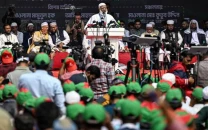Barking up the wrong tree
The government does not have any plan, except to carry around the begging bowl to the western capitals.

Our president is fighting for his survival while the prime minister is bogged down by multiple crises. As for the finance minister he can find the time to travel to Boston and address Harvard students — which clearly reflects on his sense of priorities. Meanwhile, the most powerful person in the country, the army chief, remains India-centric and tactically focused on the Pentagon and the Taliban.
Externally, the western powers are engaged in ‘currency wars’ and have made China and its strong currency the scapegoat for their problems. The drought in Russia, flooding in Canada and parched fields in Kazakhstan and Europe have ruined crops, fueling food price inflation worldwide. Russia and Ukraine, two of the world’s largest producers of wheat, have stopped exporting wheat. Faced with the threat of a supply crunch, India recently increased support prices for wheat and pulses to encourage farmers to grow more.
Many government and even private economists seem to be oblivious of the international context we are operating in. Dr Ashfaq Hassan Khan recently wrote in the The News advocating a freeze in the price of wheat — which is likely to do more harm than good.
The Americans are both begging and threatening the Chinese to devalue their currency to make US exports more competitive. Poverty and inequality in the US are at an all-time high with around half of those currently unemployed out of a job for more than six months. Clearly, we are barking up the wrong tree for a strategic alliance and aid.
The initiative taken by some political parties and groups for the cancellation of Pakistan’s $55 billion of foreign debt is important but unlikely to succeed. But that is just one issue. The two more important ones are taxes on the rich and drastic cuts in military and civilian establishment expenses. We can save about 1.5 per cent of the GDP by making deep cuts in military and civilian expenditures, and by reforming tendering and land auction systems.
It is possible to generate 1.5 per cent of the GDP from taxes on the rich, regardless whether they are urban, rural, landlords or businessmen. Thus we can generate $8-10 billion per annum from debt cancellation, expense savings, and additional taxes or $5billion every year, (excluding debt cancellation).
However, my experience with government officials has convinced me that nobody wants to do anything. The only way to force them is through a mass movement.
Published in The Express Tribune, October 25th, 2010.



















COMMENTS
Comments are moderated and generally will be posted if they are on-topic and not abusive.
For more information, please see our Comments FAQ